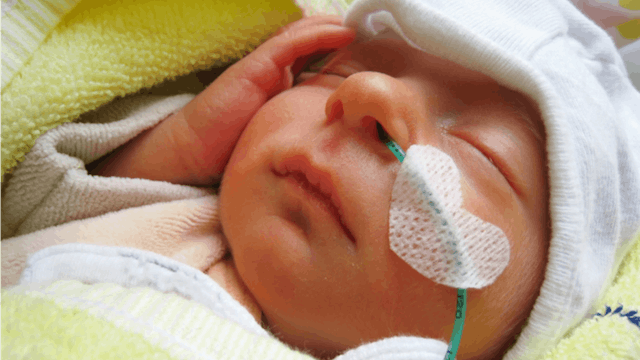Scientists Have Discovered That Breastmilk May Help Preemies With Brain Injuries

Breastmilk offers excellent, balanced, and super-healthy nutrition for your little one. But it’s so much more than just a food. It’s packed full of antibodies, antivirals, hormones, stem cells, growth factors, and enzymes– all of which are tailor made for your baby to promote healthy growth and development.
When a mom or baby becomes ill, for example, the composition of her breastmilk changes dramatically to protect her baby. So many of us moms have witnessed this firsthand, with our babies getting sick less often or becoming less seriously ill. Breastmilk protects babies in the short term from many common infections they may encounter – and also affords lifetime protections from conditions like diabetes, obesity, heart disease, and more.
And get this: breastmilk has a substance in it called HAMLET that been shown to kill cancer cells. Yes, really: check out this incredible study. Scientists are in the process of figuring out ways to harness breastmilk’s cancer-crushing properties.
Yep — breastmilk is nothing short of miraculous. It’s part of why we breastfeeding moms pretty much use it for everything. Sore nipples? Put some breastmilk on them. Pink eye? Ear ache? Diaper rash? Baby’s got a boo-boo? Squirt a little milk on it and it will be all better in the morning.
Breastmilk is particularly important for premature babies who are more susceptible to illness and who need all the nutritional and developmental boosts they can get. Breastmilk has been strongly proven to protect them from Necrotizing Enterocolitis (NEC), a serious condition primarily affecting preemies. Moms of preemies produce milk higher in protein and bioactive molecules compared to moms of full-term babies – and feeding preemies breastmilk reduces their incidences of sepsis.
And here’s another mind-blowing factoid to add to the list. Recent research is shedding light on a new and totally remarkable way that breastmilk could protect premature babies. Here’s the scoop: Researchers in Germany have observed that breastmilk administered intranasally (via the nose) could protect preemies who have experienced severe brain injuries.
The research – published in The European Journal of Pediatrics, and still in an experimental stage – was based on the idea that breastmilk has stem cells in it (neurotrophins and mesenchymal stem cells, according to the researchers) which may have the capacity to repair brain injuries in preemies. The idea is that delivering the breastmilk by way of the nasal cavity can actually get those stem cells right into a baby’s brain tissue. Absolutely amazing.
All Things Neonatal explains this phenomenon in an article about the new research:
“[T]he distance from the nasal cavity to the brain is relatively short,” they explain. “Without going into exhaustive detail it has been demonstrated in animal models that provision of medications intranasally can reach the brain without traversing the blood stream. This affords the opportunity to provide substances to the neonate through the nasal cavity in the hopes that it will reach the brain and achieve the desired effect.”
Just how cool is that?
So here’s how the researchers studied this whole thing. They recruited 31 extremely low birth weight preemies who presented with intraventricular hemorrhage (brain bleeding). All of the babies were breastfed, but 16 of them received nasal application of breastmilk. The milk was used within 2 hours of expression, started within the first 5 days after birth – and continued for at least 28 days.
Here’s what they found. The babies who received intranasal breastmilk had “a trend to a lower incidence” for three conditions, according to the researchers: severe porencephalic, progressive ventricular dilatation, and surgery for posthemorrhagic hydrocephalus.
“The hypothesis is generated that early intranasal application of breast milk could have a beneficial effect on neurodevelopment in preterm infants,” explain the researchers.
Again, the research is still in its early stages here, and the study is small, but it looks very promising, according the All Things Neonatal.
“The results don’t reach statistical significance but there is a trend at the bottom of the table above to having less progressive ventricular dilatation and surgery for the same,” they write. “Regardless, be on the lookout for this research as I suspect we may see more studies such as this coming and soon!”
Yes, it’s promising indeed, and I really do hope researchers delve deeper into this. Premature babies are so vulnerable, and their parents and healthcare providers want to do everything in their power to protect them. Having another powerful tool like this would be wonderful and vital. It could truly save lives.
Research like this is so important, and it’s also just inspiring in general to all of us breastfeeding mamas out there. We work our asses (errr, boobs) off to provide the best stuff on earth to our kiddos, and it’s not always easy. A study like this affirms that fact that breastmilk really is as awesome and protective to our babies as everyone says it is.
And you don’t necessarily have to be a full-time exclusively breastfeeding mama to get these benefits. Breastfeeding is fantastic whether we breastfed our babies for 1 day or 1 year. Every drop counts.
So next time someone laughs at your while you squirt breastmilk directly onto your baby’s skinned knee or in their crusty eye, you can tell them “Hey, it’s science.”
This article was originally published on